UC Merced participated in a new gathering designed to ensure University of California research is informed by and benefits local, regional and national community members.
The Community Engagement Retreat brought together leaders, researchers, and community partners from across the UC system, the state of California and the NIH National Center for Advancing Translational Science.
Public health Professor Arturo Durazo represented UC Merced at the retreat, held in September at UC Davis. The event – the first of its kind for the UC system – was convened by UC Biomedical Research Acceleration, Integration and Development (UC BRAID).
The two-day gathering facilitated conversations across multiple campuses and community partners to promote community-engaged involvement, leadership and participation in clinical and translational science and the research process.

Charah Coleman, the program manager for the at UC Merced's Financial Wellness Center, has been selected to receive the 2025 Central Valley Trailblazer Award. For sixteen years, the African American Historical and Cultural Museum has hosted the Trailblazer Award event to recognize the achievements of those who have paved the way for progress and continue to uplift and empower others.
According to event organizer Lataria Hall, Coleman was selected for her tireless service and advocacy work in economic justice and wellness, which includes founding the Financial Wellness Center.
"As a Trailblazer, Charah embodies resilience, excellence, and a deep commitment to justice, education, the arts, and service," said Hall. "Her contributions strengthen our collective history and inspire future generations to dream boldly and lead with purpose."

Pictured: UC Merced students are all smiles after taking first place.
A team of undergraduate students (Alton Chao, Erika Maquiling, Edmund Chao, Shyam Gupta, Roshan Sanjeev) and visiting graduate student (Tonko Bossen) from Ross Greer's Machine Intelligence, Interaction, and Imagination (Mi3) Laboratory won First Place in the Navigation Instruction Generation Challenge at the "Accessibility, Vision, and Autonomy Workshop" at the IEEE/CVF Computer Vision and Pattern Recognition (CVPR) conference.
The winning approach is titled, "Automated Context-Aware Navigation Support for Individuals with Visual Impairment Using Multimodal Language Models in Urban Environments".
Following presentation at CVPR, an extended version of the work was then accepted to the "Vision Foundation Models and Generative AI for Accessibility: Challenges and Opportunities" workshop at the International Conference on Computer Vision.

Pictured: Students demonstrate nonverbal commands as part of their research.
Tonko Bossen, a visiting graduate student to Ross Greer's Machine Intelligence, Interaction, and Imagination (Mi3) Lab, received the "Best Application Paper Award" at the "DriveX Workshop on Foundation Models for V2X-Based Cooperative Autonomous Driving" at the IEEE/CVF Computer Vision and Pattern Recognition (CVPR) conference.
The title of the research paper was "Can Vision-Language Models Understand and Interpret Dynamic Gestures from Pedestrians? Pilot Datasets and Exploration Towards Instructive Nonverbal Commands for Cooperative Autonomous Vehicles".
Tonko is a visiting MS student from Aalborg University in Denmark, where he is a member of Andreas Møgelmose's Visual Analysis and Perception (VAP) Lab.

A UC Merced multimedia project that meditates on how war traumatizes everyday lives will be screened at a Danish film festival.
“After the War: an Ultrasonic Meditation” is a collaboration between media and performance studies Professor Yehuda Sharim and graduate students Chiquitha Aminsalehi, Shiraz Noorani and Bethany Padron. It combines original music, poetry, spoken words and video.
“After the War” is a Best Short Film award finalist at the Nature & Culture International Poetry Film Festival in Copenhagen. A screening is scheduled Oct. 11.
The version entered for the festival features Aminsalehi and Padron. Noorani appears in the project’s full album, posted on the website of the University of California Humanities Research Institute. UCHRI facilitates experimental, interdisciplinary humanities scholarship through partnerships, research initiatives and competitive grants.
“After the War” also is scheduled to be screened Nov. 5 at the Central Library in Calgary.
The seeds for “After the War” were planted last year, when Aminsalehi and Padron talked about visualizing and expressing the effects of war on their ancestors and on generations to come.
“We wanted to give honor to those who lost their lives too soon in a constant struggle against greed, consumption, domination and anguish,” Aminsalehi said. They wrote some lines separately, then read them to each other.
“When we finished, our eyes smiled,” she said.
For Noorani, a native of Afghanistan, war was a part of life.
“I grew up where every morning's newsbreak brought reports of killings, injuries or explosions,” he said.
Separately, Yehuda’s most recent documentary, “Where’s My Coffee Cup?” received honorable mentions recently at the Awareness Film Festival in Santa Monica and the Peachtree Village International Film Festival in Atlanta.

Pictured: Undergrads Aryan Keskar (left) and Srinivasa Perisetla
UC Merced undergrads Aryan Keskar and Srinivasa Perisetla received a "Best Paper Award" at the 3rd Large Language and Vision Models for Autonomous Driving (LLVM-AD) Workshop, held at the 2025 IEEE/CVF Winter Conference on Applications of Computer Vision (WACV) in Tucson, Arizona. Aryan and Srini are both CSE students in Professor Ross Greer's Machine Intelligence, Interaction, and Imagination Lab (Mi3).
The award was announced at the closing session of the workshop, recognizing their paper, "Evaluating Multimodal Vision-Language Model Prompting Strategies for Visual Question Answering in Road Scene Understanding" (Keskar, Perisetla, Greer). The group was accompanied at the workshop by visiting graduate researcher from Aalborg University, Tonko Emil Westerhof Bossen, who is spending the semester in the Mi3 lab and mentored the undergraduate team in preparation for their presentation.

SSHA Outstanding Graduating Students: (standing, from left): Anaya Cambridge, Mina Lawson, Maylyn Ankary Torres, Christopher Finley, Emily Rodriguez, Kendra Sesco, Elisa Kanervisto, Brandon Casteneda, Patience Ferriera; (seated, from left) Alisa Ruiz Rios, Kahilan Skiba, Kimberly Barillas, Karla Ramirez.
Thirteen UC Merced students were honored by the School of Social Science, Humanities and Arts for outstanding undergraduate careers.
At a reception May 15 at Vista Ranch, Dean Leo Arriola said the honorees made their mark with significant research activities, exemplary leadership and notable service to UC Merced and the community. Each student was scheduled to graduate this year with a bachelor's degree and a cumulative grade point average of at least 3.5.
Here are the honorees, listed with their hometown, along with a second major or a minor degree where applicable:
Kimberly Barillas, East Palo Alto, critical race and ethnic studies.
Anaya Cambridge, Merced, anthropology.
Brandon Castaneda, Los Angeles, management and business economics (political science minor).
Patience Ferriera, Bakersfield, sociology.
Christopher Finley, Ceres, English.
Elisa Kanervisto, San Diego, writing studies.
Mina Lawson, Milpitas, philosophy (second major in cognitive and information sciences).
Karla Guadalupe Ramirez, Napa Valley, political science (second major in management and business economics).
Alisa Ruiz Rios, Fresno, public health and Spanish.
Emily Rodriguez, Atwater, psychological sciences.
Kendra Sesco, Gainesville, Fla., history (critical race and ethnic studies minor).
Maylyn Ankary Torres, Bakersfield, global arts studies (second major in psychology).
Kahilan Skiba, Santa Clarita, cognitive and information sciences (philosophy minor).
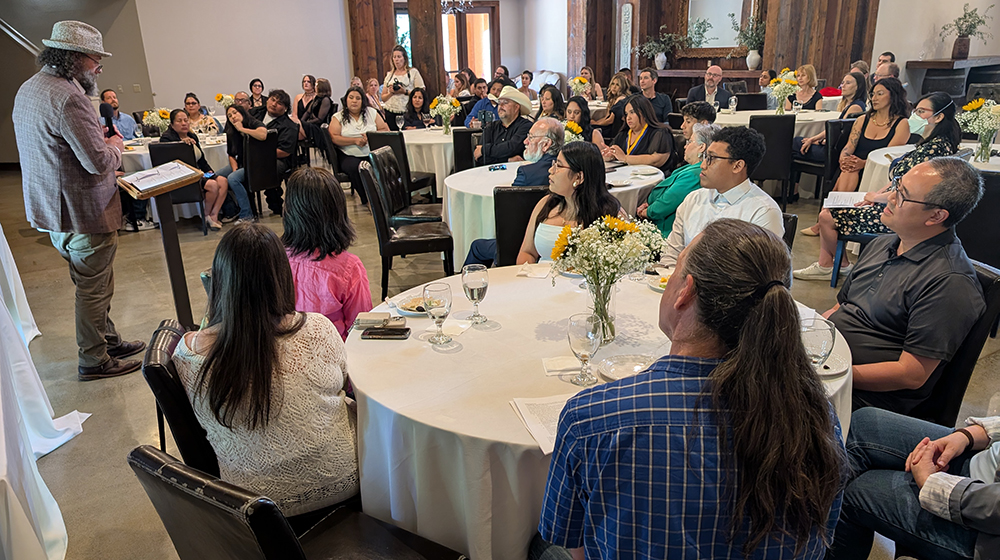
A well-attended awards ceremony at Vista Ranch.
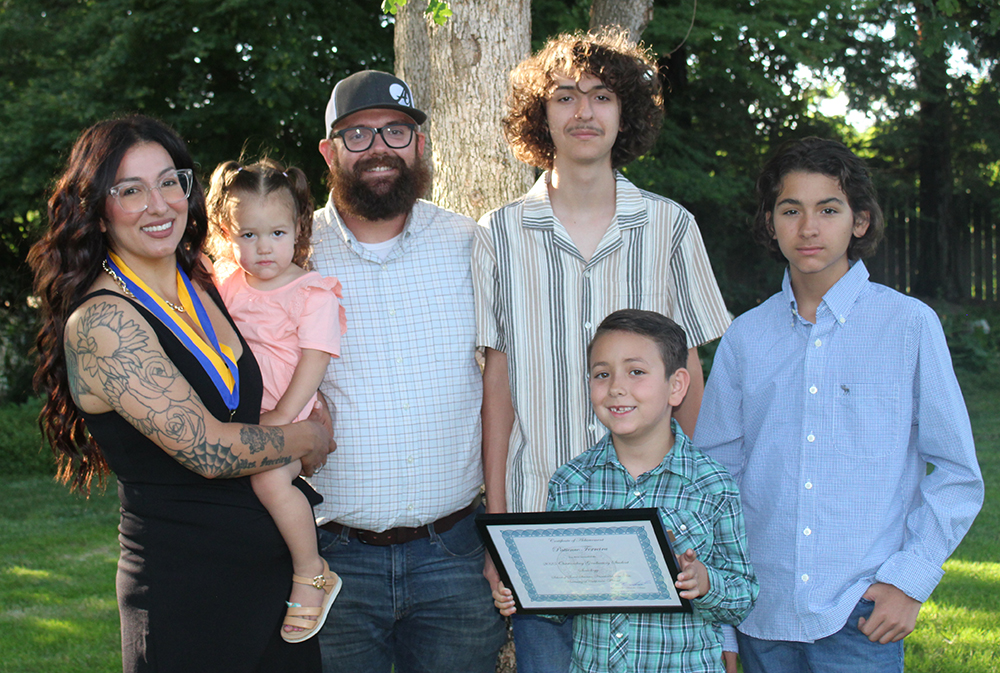
Honoree Patience Ferriera and her family.

A UC Merced first-year student’s essay about the challenges of living in the San Joaquin Valley with a respiratory illness earned him the 2025 Karen Merritt Writing Fellowship Award.
Peter Nguyen, who majors in biological sciences with an emphasis on human biology, will receive $1,000 with the award, which recognizes an undergraduate who demonstrates analytical skills, creativity and research promise in first-year writing.
Nguyen was nominated by lecturer Bay VanWagenen , his Writing 10 course instructor in the university Merritt Writing Program.
The essay title is “The Impact of Growing Up and Living in the San Joaquin Valley on Asthma and Respiratory Illnesses.” Professor Lora Burnett, the Merritt program’s associate director, said VanWagenen’s nomination said Nguyen identified a research need, used several scholarly sources, organized the information effectively, and presented it all with accessible prose that demonstrated creativity and rhetorical awareness.
Nguyen said his mother offered memorable advice when he thought essay writing was too daunting a task. Just keep trying, she said, and do your best.
“Now, at UC Merced, I continue to embrace this thinking, always eager to face challenges that build my confidence in expressing new and complex ideas,” he said.
The Merritt Writing Program offers courses in first-year writing; creative and professional writing; and upper-division academic writing. There also are Spark seminars that sharpen the art of inquiry through multiple perspectives and experiences.

“Who but When, How," an autobiographical project by award-winning filmmaker and UC Merced Professor Yehuda Sharim, premieres May 11 at the Ethnocineca international documentary film festival in Vienna, Austria.
The film is an intimate contemplation of Sharim’s childhood home in Israel, where visits with his aging father are juxtaposed with the conflict and violence engulfing the Middle East.
“I don’t recognize the country of my birth, and it does not recognize me,” Sharim said. “There, I visit my father, who cannot remember my name. They are both changing forever, disappearing, refusing to be embraced.”
“Who but When, How” is on a short list for Ethnocineca’s Excellence in Visual Anthropology Award.
A grant from the Henry Luce Foundation provided funding for the film.
Ethnocineca is an eight-day festival dedicated to documentary and ethnographic films. It has been a part of the domestic and international film festival calendar since 2007.
Sharim, a professor of media and performance studies, said he hopes the film can help Muslim and Jewish people in Israel and the Palestinian territories find common ground to share their feelings of loss.
“Here, cinema does what governments and army generals cannot foresee – creating a meeting space for deep listening, understanding and compassion in a world bleaker with each passing day,” he said.

UC Merced graduate students and their professor have collaborated on a sound-based documentary that meditates on the wars that traumatize everyday lives and how we can push back with determination, compassion and love.
“After the War: an Ultrasonic Meditation” was made in collaboration with the University of California Humanities Research Institute. UCHRI facilitates experimental, interdisciplinary humanities scholarship through partnerships, research initiatives and competitive grants.
“After the War” was created and composed by Professor Yehuda Sharim, with contributions from Merced community members and Interdisciplinary Humanities graduate students Chiquitha Aminsalehi, Shiraz Noorani and Bethany Padron. The project combines original music, poetry, spoken words and video.
“This sonic documentary is not about a utopic future after the war, but an invitation and provocation to return home, come to terms with the harm and injuries we commit and carry and turn internal spite into unflinching determination and tenderness in a world obsessed with calamities and rancor,” Sharim wrote for the UCHRI presentation.
Sharim said the seeds for “After the War” were planted last year, when he worked on how to show the ways people find a path to healing amid violence that is normalized and injustices that are treated like casual events.
Aminsalehi and Padron, after joining the project, met at the UC Merced Library each week to exchange ideas. They began to visualize the effects of war on their ancestors and on generations to come.
“We wanted to honor those who lost their lives too soon in a constant struggle against greed, consumption, domination and anguish,” Aminsalehi said.
They wrote some poetry stanzas separately, then read them to each other.
“When we finished, our eyes smiled,” she said. “We knew we had created something that would last and pay homage to what it meant to convene and reflect on what our souls sought to say.”
They had discussed the project’s broad strokes in a conversation with Sharim months earlier. With the words in hand, “After the War” moved forward. Through his community work, Sharim composed the soundscape music. The students interpreted their words in front of the camera.
“Personal experiences reflected in this project have lingering touches of surviving,” Padron said. “Because the wounds have been deep, I wear red lipstick in the filming as a reminder that I am alive.”
For Noorani, a native of Afghanistan, war was — is — all too real. “I grew up where every morning's newsbreak brought reports of killings, injuries or explosions,” he said. A close friend was among two dozen people killed in an attack by Islamic State gunmen at Kabul University in 2020.
“War may end in a specific time and place, but its aftermath stays within us,” Noorani said. “It shapes identities and beliefs in ways we may not anticipate. The battles we fight in ourselves — the grief, the loss, the search for meaning — stay long after the last gunshot is fired.”

UC Merced’s Center for Excellence in Faculty Advancement turned heads in higher education and beyond this past year with research that revealed problems in promotion and tenure decisions such as gender bias and double standards against underrepresented faculty.
These revelations, which led institutions nationwide to rethink their policies, have earned recognition from the American Psychological Association’s Division 14, the field’s leading scientific and professional organization for psychologists who study work environments.
The center (CEFA), a multi-institution group led by Professor Christiane Spitzmueller, UC Merced's vice provost for academic affairs and strategy, received this year’s Raymond A. Katzell award from Division 14, also known as the Society for Industrial and Organizational Psychology.
The award recognizes society members whose research work has meaningfully impacted people and public policy by addressing societally relevant issues.
The award's announcement honored Spitzmueller and the CEFA center for research on promotion and tenure that has altered career advancement policy recommendations for faculty at several institutions across the United States.
"The Center for Excellence in Faculty Advancement, with all of the consortium's member institutions, is so deserving of award recognition,” Spitzmueller said. “It is unusual for research work to have such an immediate impact on policies and practices.
“This work would not be possible without UC Merced's support and collaboration, which includes partnership with the Division of Equity, Justice and Inclusive Excellence and Chief Diversity Officer Delia Saenz, along with support from the fabulous staff at the Health Sciences Research Institute, which is managing our grants.”
Spitzmueller also was named a fellow of the Society for Industrial and Organizational Psychology. In an announcement, the society cited significant contributions to research into workplace inclusion, mentorship, work-family dynamics and employee development.
The society noted that Spitzmueller has secured over $6.5 million in National Science Foundation grants, along with funding from organizations such as the Gates and Sloan foundations and the National Academies of Sciences, Engineering and Medicine.
Photo: UC Merced's Christiane Spitzmueller (front row, third from left) with other fellows of the American Psychological Association's Society for Industrial and Organizational Psychology.

Professor Estee Beck, director of UC Merced’s Merritt Writing Program, has been named to the Academic Advisory Board of the University of California’s National Center for Free Speech and Civic Engagement .
The center strives to ensure everyone with a stake in higher education is prepared to defend and advance the free speech rights enshrined in the First Amendment. The center’s efforts are especially crucial amid the current national debate about free speech on campuses and in society at large.
“I value free speech as a cornerstone of higher education and am honored to join the center’s Academic Advisory Board,” Beck said. “I look forward to contributing to discussions that uphold and advance this fundamental right in our academic communities.”
Center Executive Director Michelle Deutchmann said of Beck: “One of greatest strengths of the UC system is its unmatched scholarly expertise, which is represented by the center’s Academic Advisory Board. Estee Beck is no exception. Writing is one of the critical means available for expression, and I know the center will benefit from her critical perspective.”
The Academic Advisory Board is comprised of UC faculty members. The center also has a National Advisory Board made up of thought leaders from outside the UC system.
Through research, advocacy and discussion, the center works to move the debate from sound bites to thoughtful dialogue.
One of its most effective programs is the Valuing Open and Inclusive Conversation and Engagement (VOICE) initiative, which provides up to $5,000 for UC students, staff and faculty interested in conducting research or coordinating activities that explore the intersection of expression and democratic learning and what can be done to restore trust in free speech.
Beck has held her current position at UC Merced since July 2021. Previously, she was an English professor at the University of Texas at Arlington.
She joins UC Merced colleague Anne Kelley, a professor of chemistry and biochemistry, on the center’s Academic Advisory Board.

Iris Ruiz, a continuing lecturer in UC Merced’s Merritt Writing Program and a nationally recognized champion for including traditionally ignored voices and histories in her teaching, has been honored as this year’s Sustained Outstanding Teacher by the Conference on College Composition and Communication.
The conference recognized Ruiz, a native of the Central Valley, for her “commitment to decolonizing and rehumanizing the classroom. Her work helps students locate writing — and themselves — in local, historical, cultural and digital contexts, allowing them to explore their own intersectional identities.”
Ruiz said her work is especially important at UC Merced. She has taught at this Hispanic Serving Institution where she has taught writing for more than 14 years.
“Writing isn’t just about following rules; it’s about telling your own story and understanding others,” Ruiz said. “When we challenge traditional ways of teaching writing, we open up new ways for students to express themselves, connect with their culture, and make change in their communities.”
The Conference on College Composition and Communication supports diverse communicators inside and outside postsecondary classrooms. The Sustained Outstanding Teacher award is for instructors with at least 11 years of experience in teaching first-year writing.
Ruiz, who earned a Ph.D. in philosophy and literature from the University of California San Diego, has authored papers and contributed to several books on decolonizing composition and rhetoric. Her latest contribution is a chapter on Chicana feminist rhetoric for “The Routledge Handbook of Contemporary Feminist Rhetoric,” published in December 2024.
In spring 2024, it was announced that Ruiz had received an Outstanding Scholarship Award from the Council of Writing Program Administrators for her chapter in the book “Race, Rhetoric and Research Methods.” Her chapter is titled “Critiquing the Critical: the Politics of Race and Coloniality in Rhetoric, Composition and Writing Studies Research Traditions.”
“Iris’ research and teaching create spaces where students see their diverse cultural and linguistic identities valued in academic writing, empowering them to find their voices and engage critically with the world,” said Estee Beck, director of the Merritt Writing Program.

UC Merced student Maddison Crump, who works to help ensure foster youth and formerly incarcerated students have resources to thrive, was among several young scholars recognized recently by University of California President Michael V. Drake and the UC Board of Regents for their leadership, resilience and significant contributions to the university.
Crump, who serves as the Belonging and Resilience Fellow in the UC Merced Calvin E. Bright Success Center , received the Regents Foster Youth Award. Crump also serves as a Merced County court-appointed special advocate in support of children in foster care. In this role she collaborates with social workers, foster parents, school personnel and others involved in a child’s case, preparing detailed court reports to assist in making decisions about the child’s future.
“Whether it’s advocating for foster youth in court or higher education, or supporting impacted individuals or mentoring others, I’m motivated by the belief that we all deserve the opportunity to thrive, no matter what hand we’re dealt in life,” said Crump, a fourth-year student majoring in psychology. “This award is a reminder of what’s possible when we come together to support one another.”
At the award ceremony, held during the Regents’ meeting Jan. 22-23 in San Francisco, UC Merced Chancellor Juan Sánchez Muñoz said Crump exemplifies “what it means to be a member of the Fiat Lux family and certainly a UC Merced Bobcat.”

A UC Merced-produced video that spanned 13 time zones, linking the Spendlove social justice prize to its honoree, the Dalai Lama, earned an award of excellence from the Council for Advancement and Support of Education.
CASE gave its Circle of Excellence Gold Award to the university’s Division of External Relations in the category of one-time, online special events.
The Dalai Lama, spiritual leader of the Tibetan people, was honored in September 2023 as that year’s recipient of the Alice and Clifford Spendlove Prize in Social Justice, Diplomacy and Tolerance. The video connected the Dalai Lama from his home in India to ceremony participants in Merced.
In accepting the award , he told viewers that people must stop thinking of each other in terms of "we" and "they."
"Peace doesn't come from the sky. Who creates problems? We human beings," he said. "More than 7 billion human beings are human brothers and sisters. We have to live together."
The Spendlove Prize was established at UC Merced in 2006 to honor people who exemplify the delivery of social justice, diplomacy and tolerance in local and global society. The prize is made possible through an endowment gift from Sherrie Spendlove in honor of her late parents, who were lifelong professionals dedicated to the lives of citizens, youth and students in the Merced region.
Spendlove said the CASE award was a worthy honor not just for the 2023 event, but for all the prize ceremonies through the years. She offered special thanks to External Relations’ Protocol and Signature Events team, led by Assistant Director Chris Luna.
“As with all of our recipient events, the Spendlove Prize is made possible by the hard work, ingenuity and collaborative efforts of an entire team,” Spendlove said. “I’m glad to see people who don’t always get credit for their amazing work being recognized.”
The CASE Circle of Excellence awards celebrate efforts to advance education. The 2023 awards attracted more than 4,000 entries from institutions in 22 nations.

Yehuda Sharim, UC Merced professor of media and performance studies, has received an Underrepresented Scholars Fellowship Program award from the University of California Humanities Research Institute.
Sharim is a writer and filmmaker. His latest film, “Flora,” was honored last spring by the Latino and Native American Film Festival. Other works by Sharim include "El Ojo Comienza En La Mano" (The Eye Begins in the Hand), "Experiments in Freedom" and "Letters2Maybe."
The UC Humanities Research Institute facilitates experimental, interdisciplinary humanities scholarship through partnerships, research initiatives and competitive grants.

A Cornell University professor acclaimed for his study of the evolution, acquisition and processing of language is this year’s recipient of the Distinguished Cognitive Scientist Award presented by UC Merced’s Department of Cognitive and Information Sciences .
Morten Christiansen, the William R. Kenan Jr. Professor of Psychology at Cornell and a professor in cognitive science of language at Aarhus University in Denmark, is the 15th honoree of the award, which debuted in 2008. Initiated by a gift from Robert Glushko and Pamela Samuelson, the award is given each year to an individual who has contributed influential and groundbreaking work to cognitive science.
Christiansen will come to UC Merced on Oct. 14 to receive the award and give a public lecture.
“I’ve known Morten since were faculty together at Cornell a couple decades ago,” said UC Merced Professor Michael Spivey, a member of the award committee. “He is a truly interdisciplinary cognitive scientist who has made profound advances to our understanding of how language happens. He’s an elegant writer, an excellent presenter and a wonderful human being.”
Christiansen has forged new insights into how environmental and biological influences interact to shape language evolution, language learning and real-time language processing. His research — including neuroimaging and behavioral experiments, computational simulations and corpus analyses — has dramatically reshaped the landscape of the traditional debate over nature vs. nurture.
The Denmark native is a member of the Royal Danish Academy of Sciences and Letters and the Royal Norwegian Society of Sciences and Letters. Christiansen has authored more than 250 scientific papers. He co-authored the 2022 book “The Language Game: How Improvisation Created Language and Changed the World.”

UC Merced’s Department of Sociology earned a quartet of awards at the American Sociological Society annual meeting, held this year in Montreal on Aug. 9-13.
Professor Stephanie Canizales received an Early Career Award in the Children and Youth section.
Professor Ed Flores received the Dan Clawson Activist-Scholar Award from ASA’s Labor and Labor Movements section.
Professor Tanya Golash-Boza was honored with the Outstanding Book Award from the Community and Urban Sociology section.
An article by Professor Veronica Lerma received a Graduate Division Alumni Award.
Canizales was recognized for distinguished contributions to research, teaching and service. Candidates must have received their Ph.D. within 10 years of nomination. Canizales left the UC Merced faculty this fall to take a position at UC Berkeley.
Flores, a member of the UC Merced faculty, was recognized as an outstanding educator who engages in efforts for social change. The award’s namesake, the late Dan Clawson, was a longtime sociologist at the University of Massachusetts and a lifelong champion of social justice.
Award committee members said Golash-Boza’s 2023 book, “Before Gentrification: The Creation of D.C.’s Racial Wealth Gap,” reaches far beyond classic research into gentrification. “It demonstrates that a violent cycle of dispossession, displacement and disinvestment was followed by racialized reinvestment,” they wrote. “Black residents of Washington, D.C. were offered prisons as the sole solution to the problems they faced in their communities.”
Golash-Boza is on leave from the UC Merced faculty to serve as executive director of University of California’s student and faculty instructional and research center in Washington.
Lerma, who earned her doctorate at UC Merced and is on the sociology faculty at UC Davis, earned her award for a paper titled “Intersectional Criminalization: How Chicanas Experience and Navigate Criminalization through Interpersonal Relationships with Latino Men and Boys.”

UC Merced's campus Grad Slam champion Aneelman Brar took home the People's Choice award at UC Grad Slam finals held on May 5 at LinkedIn in San Francisco. View her talk online.

Cognitive and Information Sciences (CIS) Professor Lace Padilla has been named a Rising Star by the Association for Psychological Science (APS) for her groundbreaking research on how people make decisions using data visualizations, such as forecasts of COVID-19 cases or hurricane trajectories. The designation is presented to "outstanding APS Members in the earliest stages of their research careers post-Ph.D.," according to the association's website.

Physics Ph.D. student Md Mehdi Masud has been named an American Physical Society (APS) Student Ambassador.
Masud is one of 68 students from around the world who received this recognition and opportunity to represent their universities to APS and introduce APS opportunities to their own universities. Student ambassadors can build their professional networks and improve their leadership skills while working with diverse people in STEM fields.
Masud is studying the interesting behavior of materials at extreme conditions in Professor David Strubbe’s lab. His research focuses particularly on computational high energy density physics — which is a new subfield of physics that intersects condensed matter physics and plasma physics — at extreme conditions of pressure and/or temperature. He is working to provide an in-depth explanation as well as necessary predictions to future experiment groups working in this highly challenging area of research.
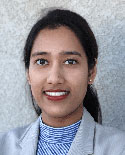
Mechanical Engineering Ph.D. candidate Saima Aktar Sumaiya was awarded a Graduate Research Award from the American Vacuum Society (AVS).
Sumaiya is studying the atomic-scale structure and electronic properties of 2D materials by real-space surface imaging under ambient conditions in Professor Mehmet Baykara’s lab.
The Graduate Research Awards were established in 1984 to recognize and encourage excellence in graduate studies in the sciences and technologies of interest to AVS. Each consists of a cash award, a certificate and reimbursed travel support to attend the International Symposium.

EECS Professor Shijia Pan was awarded the best demo award at the Conference on Embedded Networked Sensor Systems (SenSys 2022) held in November. The demo abstract titled, "MOOCA: Miura-Ori Origami-Based Configurable Shelf-Liner for Autonomous Retail," is a project supported by AiFi Inc. to build a low-cost elastic sensor inspired by origami – the Japanese paper folding structure. Authors include Pan, Shubham Rohal and Yue Zhang from UC Merced and Carlos Ruiz from AiFi Inc.

Ph.D. student Kris Gulati was awarded a $50,000 Wikimedia Research and Technology Fund grant by the Wikimedia Foundation to look at its role in shaping and directing science.
Gulati, who works with Chair of Department of Economics and Business Management Professor Christian Fons-Rosen, is interested in the economics of science and innovation.
“Largely, I'm interested in how we can improve scientists' productivity to increase the quality and quantity of academic research and translate that into improved living standards for people,” Gulati said. “A quote by Ioannidis I love summarizes it well, ‘Science is the best thing that has happened to humans, but we can do it much better.’”

Director of UC Merced's Campus Advocacy, Resources & Education, or CARE, Yesenia Curiel was awarded Outstanding Latina Woman by the Merced County Hispanic Chamber of Commerce. Each year, Merced County's Hispanic Chamber of Commerce honors outstanding Latina women who demonstrate a true commitment to service and compassion.
Yesenia was nominated by Merced community members and was one of three women chosen to receive the award on the first day of Hispanic Heritage Month (9/15/22). Yesenia also received recognition from the city of Merced, Senator Anna Caballero, Senator Adam Grey, Senator Alex Padilla, Congressman Jim Costa, and California's Attorney General Rob Bonta at this event.

In recognition of her ongoing support and advocacy for women in technology, Director of Cyber Infrastructure and Research Technologies, Sarvani Chadalapaka, has been appointed co-chair for Internet2's Inclusivity Initiative (I2I) Steering Committee. Internet2 is a consortium of 320+ member institutions that provides a secure high-speed network, cloud solutions, research support, and other technology services tailored for research and education.
Being chosen for this role represent a full-circle for Chadalapaka, having been awarded an I2I scholarship in 2017 that helped jump-start her career. A tireless advocate for women in technology, Chadalapaka delivers talks on equity and inclusivity at various conferences across the country and founded a Women in High Performance Computing mentorship program.
"Chadalapaka's work has directly contributed to OIT's ability to attract and retain women in historically male-dominated technology fields," said Interim Chief Information Officer Nick Dugan. "Her recognition in this space demonstrates UC Merced's commitment and leadership in building a diverse, inclusive, and representative workforce, and I am grateful to have her as a stand-out member of OIT's leadership team!"

CIS Professor Tyler Marghetis is one of 74 named a Kavli Fellow by the National Academy of Sciences (NAS) at the 2022 Kavli Frontiers of Science U.S. Symposium, which is the Academy’s premiere activity for distinguished young scientists. A committee of NAS members selected the participants from among young researchers who have already made recognized contributions to science.
The Frontiers of Science symposium series provides a forum for the future leaders in U.S. science to share ideas across disciplines and to build contacts and networks as they advance in their careers. More than 6,000 young scientists have participated since the program’s founding in 1989; to date, 298 participants have been elected to the NAS and 17 have been awarded the Nobel Prize.
The Kavli Foundation, based in Los Angeles, California, is dedicated to advancing science for the benefit of humanity, promoting public understanding of scientific research, and supporting scientists and their work. The Kavli fellowship program is aimed at helping outstanding scientists learn about research at frontiers of fields other than their own, and helping participants develop a network of connections.
UC Merced Ph.D. student Reo Maynard and his advisor Professor Gordon Bennett have been selected as one of 51 student-adviser teams awarded with the prestigious Howard Hughes Medical Institute (HHMI) Gilliam Fellowship.

The Chemical Engineering and Molecular Engineering and Sciences departments at University of Washington, Seattle, invite young scholars and scientists annually to present their research and provide professional development opportunities during the Distinguished Young Scholars Seminar 2022.
On Aug. 1, Postdoctoral Scholar Syeda Tajin Ahmed, Ph.D., in the Department of Materials Science and Engineering at UC Merced presented an hour-long seminar on “Interactions of Grafted Zwitterionic Polymers with Biomolecules at Nanoscale.”
“I explained how I measured adsorption of different kinds of proteins on zwitterionic polymer coated substrates, the adsorption mechanism and the surface forces that control polymer-materials interactions,” Ahmed said. “I also talked about my current postdoctoral work in Professor Roberto Andresen Eguiluz’s lab on the role of fibronectin in lubricating boundary film formation at the articular cartilage.”
Electrical Engineering and Computer Science undergraduate Shreya Shriram, in Professor Shijia Pan's lab, won the Best Poster Award at IPSN 2022 conference for their paper, “Sedentary Posture Muscle Monitoring via Active Vibratory Sensing,” co-authored by Pan, graduate students Shubham Rohal, Zhizhang Hu and Yue Zhang, and VP Nguyen from University of Texas, Arlington.
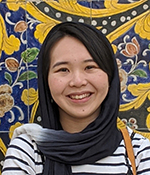 Interdisciplinary Humanities Ph.D. student Amanda Leong received the Medieval Academy of America’s 2022 Belle da Costa Green Award.
Interdisciplinary Humanities Ph.D. student Amanda Leong received the Medieval Academy of America’s 2022 Belle da Costa Green Award.
Belle da Costa Greene was a prominent art historian and the first manuscript librarian of the Pierpont Morgan collection. She was also the first known person of color and second woman to be elected a Fellow of the Medieval Academy of America (1939).
Belle da Costa Green's legacy highlights the professional difficulties faced by medievalists of color, the personal sacrifices they make to belong to the field, and their extraordinary contributions to medieval studies. The award is granted annually to a medievalist of color for research and travel whose project speaks to the legacy of Belle da Costa Greene and whose research can contribute to the field of medieval studies.
As a recipient of the Belle Da Costa Greene 2022 Award Leong will have access to conduct in-person archival research in the Bodleian Library in Oxford and the British Library in London.
“I look forward to expanding my research more with the hope that more support can be given to Ph.D. students like myself from the Interdisciplinary Humanities program given the nature of the research work we are doing and the acknowledgment we are receiving from external, professional organizations, Leong said. “I am grateful and excited for this opportunity!”

Ph.D. candidate Amanda Caterina Leong was awarded the Middle Eastern Studies Association's 2021 Best Graduate Student Paper Award. Leong, who is in the Interdisciplinary Humanities (IH) Graduate Group, works with professors Sholeh Quinn, Aditi Chandra and Humberto Garcia to provide new understandings about intersections of race, class and gender from a premodern Persian perspective by building a genealogy of multimedia representations of female "javānmardī" — meaning chivalry.
“I am the first person from UC Merced to win this award and it will really help showcase and promote the work IH students, like me, are doing to contribute to the field,” she said.
Leong is an aerialist who uses acrobatic arts to translate and communicate her work on female power.
She has also been awarded travel and research grants from the American Institute of Iranian Studies, the Society for the Study of Early Modern Women and Gender, and the Middle Eastern Medievalists, and she received the Fred and Mitzie Ruiz Fellowship. Her research has also appeared in Ajam Media Collective (here and here), Chicago Review of Books' Arcturus Magazine and IranWire.

Electrical Engineering and Computer Science Ph.D. student Xueting Li is a recipient of the 13th annual Google Ph.D. Fellowship Program.
Li works in Professor Ming-Hsuan Yang’s Vision and Learning Lab and her research focuses on computer vision and deep learning, especially on the area of unsupervised learning and 3D computer vision. In 2020, Li was awarded a prestigious NVIDIA Graduate Fellowship.
The Google Ph.D. Fellowship Program was created to recognize outstanding graduate students doing exceptional and innovative research in areas relevant to computer science and related fields. Fellowships support promising Ph.D. candidates of all backgrounds who seek to influence the future of technology.

Quantitative and Systems Biology Ph.D. candidate Nadia Miranda received a two-year UC-National Lab In-Residence Graduate Fellowship from the UC-National Lab Fee Research Program.
The fellowship provides support for UC doctoral students to conduct in-residence dissertation research and receive professional training at Los Alamos or Lawrence Livermore National Laboratories (LLNL). The program is a partnership of the UC Office of the President's Research and Innovation and the Office of National Laboratories.
Miranda studies Coccidioides spp., the fungal pathogen species responsible for coccidiodomycosis, also known as Valley fever, with UC Merced Professor Katrina Hoyer and Gabriela Loots at LLNL.

Professor Colleen Naughton has been awarded the 2021 Grand Prize in University Research by the American Academy of Environmental Engineers and Scientists (AAEES). Naughton’s lab created an online dashboard titled “COVIDPoops19” to plot the location of global wastewater testing for SARS-CoV-2 during the pandemic. With the help of graduate and undergraduate students, Naughton's team scanned Twitter, publications, news articles and webinars to find the latest information on testing results. The dashboard was made possible through an emergency seed grant from CITRIS and now a sub-award from Michigan State University as part of a global data center for COVID-19 wastewater monitoring.

Ph.D. student Deseret Weeks was recently awarded a California State University (CSU) Chancellor’s Doctoral Incentive Program fellowship for her MIST Management of Complex Systems studies offered by the Ernest & Julio Gallo Management Program.
“Deseret has been actively engaged in sustainability research on campus since arriving at UC Merced in fall of 2019,” her advisor Professor Catherine Keske said. “I’m proud of her scholarly growth and promise as an academic which is being recognized as a recipient of this fellowship.”
Acceptance into the program is a rigorous, competitive process. The fellowship award is intended to create a pathway to tenure-track faculty positions within the CSU system while providing important connections between the CSU and University of California campuses.
Weeks and other fellows will receive support throughout their Ph.D. in the form of professional development and mentorship, grants and forgivable loans. Fellows also have the opportunity to take part in the CSU Pre-Professor Program which includes a semester-long immersive teaching opportunity for doctoral students and post-doctoral students at a CSU.

Cognitive and Information Sciences graduate student Ketika Garg is the recipient of the 2021-2022 UC Guru Gobind Singh Fellowship. Each UC campus is invited to nominate a graduate student from a specific area of India and Pakistan to compete in a systemwide competition. The fellowship provides $30,000 in support.
“I am very grateful and honored to have received this award that was established in the name of a great spiritual leader to help out Indian students who are not eligible to apply for most of the funding opportunities available to U.S. citizens,” Garg said. “I feel very lucky to have been eligible for this fellowship and I hope that other international students can get similar opportunities in the future.”
The fourth-year Ph.D. student joined UC Merced in Fall 2017 after completing a master’s in biology in India. Her research interests include anthropology, evolutionary biology and human cognition, and she is studying human foraging patterns and their cognitive basis.

Third-year Ph.D. student Brittany Lopez Barreto has been named a NASA Future Investigator in Earth Space Science and Technology, known as the NASA FINESST program. Her proposal on wildfire and water supply was selected from 835 highly competitive proposals, 351 of which were in Earth Science. The program provides three-year research grants to graduate students who design and perform projects relevant to NASA's Science Mission Directorate. Lopez Barreto is a first-generation Latina studying under Professor Erin Hestir in the Earth Observation and Remote Sensing Lab.

Electrical Engineering and Computer Science graduate student Haoyu Niu is one of 24 scientists selected for this year's Bayer Grants4Ag program. He beat out over 600 proposals from around the world.
Parasitic nematodes can cause up to 20 percent of annual yield losses for walnut growers. But Niu is aiming to curb those losses through the early detection of nematode infestations with Scio, combining cutting-edge field devices with machine learning algorithms.

Political Science Professor Jessica Trounstine’s book, Segregation By Design, is the basis for a new initiative by the Association of Bay Area Governments/Metropolitan Transportation Commission. Trounstine and her research team will assess and catalog data in each of the 109 jurisdictions to develop metrics that identify politicies likely to have contributed to housing segregation and availability. This research will help tell the story of housing inequity for Bay Area jurisdictions as they revise their Housing Elements for AB-686.The work is facilitated through STIR Labs, a national applied research program funded by the National Science Foundation which connects governments and academic teams to co-develop and apply research that offer solutions to the critical issues that communities face.

Sociology Professor Charlie Eaton and three graduate students recently submitted a winning entry in the Dignity and Debt Student Loan Data Visualization Contest. The contest, conducted through Princeton University’s VizE Lab, was created to pursue the potential in visualization in helping to solve the student loan debt crisis. The lab teamed up with the Dignity+Debt Network to call for data visualizations, maps, or short documentary films and photography that portray student loan debt. Eaton worked with graduate students Jay Colond, Luis Ruben Gonzalez, and Waleed Rajabally to produce the winning piece titled “Student Debt and the Hidden Racial Wealth Gap in Federal Aid Formulas”, which can be viewed here.

Sociology Professor Stephanie Canizales is a 2020 recipient of the American Sociology Association's Community Action Research Initiative grant award. Canizales' research is focused on migration and immigrant integration, children and youth, inequality, poverty, mobility, and race and ethnicity. She will use the award to interrogate the effects the converging refugee and health crises on legal, educational, health, and social service providers' lives. Canizales has partnered with Esperanza Immigrant Rights Project, a Los Angeles-based organization to more clearly understand the impact of these crises and government responses to them on the work dynamics, practices, attitudes, and overall well-being among service providers working with asylum-seeking Central American children, families, and communities.

Web of Science has named Psychological Sciences Professor Martin Hagger as a Highly Cited Researcher, which places him in the top one percent of researchers worldwide by citations. His work focuses on the nature of self-control and behavior change interventions. His research also identifies the psychological factors such as motivation, planning and habits that are linked to people’s health behavior, and how this information can be used to change people’s behavior. He was also recently ranked the 28th most-influential researcher in the field of Sport Sciences in a recently published study in PLOS Biology.

Sociology Professor Whitney Pirtle has been awarded the 2020 A. Wade Smith award by the Association of Black Sociologists. Established in 1998, this award honors A. Wade Smith’s tireless work as an advocate for racial justice and rising scholars in the field. Pirtle, who was nominated by her students, was recognized for excellence in teaching, mentorship and service to the study of sociology.

Soil biogeochemistry Professor Asmeret Asefaw Berhe has been elected to be a fellow in the Geological Society of America. As 2019's recipient of the GSA's Randolph W. "Bill" and Cecile T. Bromery Award for the Minorities, her fellowship this year was guaranteed. Berhe has often been recognized for her outstanding contributions to the geosciences through scholarly productivity, her scientific advances on soil carbon cycling and her work to broaden the participation of underserved and marginalized geoscientists.

Social psychology Professor Jenny Howell has been named a distinguished young alumna by her alma mater, Southwestern University in Texas. The awards are only given to one or two alumni annually.

Professor YangQuan Chen has been listed among the world’s most influential researchers by the Web of Science Group, which recognizes researchers most frequently cited by their peers. In 2019, fewer than 6,300, or 0.1 percent, of the world's researchers across 21 fields, earned this distinction. Chen researches unmanned aerial systems (drones), mechatronics, control systems, cyber-physical systems and applied fractional calculus in the Department of Mechanical Engineering in the School of Engineering. He is the second faculty member in his school to earn this distinction.

For the second consecutive year, Professor Ming-Hsuan Yang has been named one of the world’s most influential researchers by the Web of Science Group, which recognizes researchers most frequently cited by their peers. In 2019, fewer than 6,300, or 0.1 percent, of the world's researchers across 21 fields, earned this distinction. Yang researches computer vision, pattern recognition and machine learning in the Department of Computer Science and Engineering in the School of Engineering.

Economics Professor Catalina Amuedo-Dorantes won the American Society of Hispanic Economists’ 2020 Outstanding Achievement Award, recognized for both her important and prolific research on issues that affect Latinx communities in the United States and the essential role she has played in promoting the vitality of Latinx economists through her coauthoring and mentoring.

Christina Lux, associate director of the Center for the Humanities, has been awarded Honorable Mention for Best Paper of the Year from the Ecological Society of America ’s Education Section. Lux was part of an interdisciplinary and multi-university team of collaborators who wrote a Bioscience article titled “Poetry as a Creative Practice to Enhance Engagement and Learning in Conservation Science.” The piece, which draws upon peer-reviewed literature, explores the benefits of integrating science and poetry to further conservation scientists’ creative practices.

Sociology Professor Tanya Golash-Boza has received a National Science Foundation (NSF) grant for her project "Prisoner Re-Entry and Gentrification." With this funding, Golash-Boza will explore how gentrified and diverse neighborhoods help or hinder prisoners' reintegration into society. Focusing on her hometown of Washington, D.C., Golash-Boza aims to develop an understanding of barriers the formerly incarcerated face to better inform policy for reintegration and reduce individuals' odds of returning to prison.

Political Science Professor Jessica Trounstine's book "Segregation by Design: Local Politics and Inequality in American Cities" has been recognized with two American Political Science Association (APSA) section book awards. The book was awarded the J. David Greenstone Book Prize from the Politics and History Section, as well as the Best Book in Race, Ethnicity, and Urban Politics from the Race, Ethnicity, and Politics section. In "Segregation by Design," Trounstine explores more than 100 years’ worth of data from thousands of American cities to understand how local governments generate race and class segregation within and between cities, often at the expense of people of color and the poor in order to enhance the wealth and resources of white property owners.

The Geological Society of America (GSA) named Professor Asmeret Asefaw Berhe the winner of this year’s Randolph W. "Bill" and Cecile T. Bromery Award for the Minorities for her internationally recognized outstanding contributions to the geosciences through impressive scholarly productivity, scientific advances on erosion and fire effects on soil carbon cycling, professional service and leadership, mentoring and training of a diverse team of early career professionals, and broadening participation of underserved and marginalized geoscientists. The GSA recognizes outstanding scientific achievement and distinguished service to the profession each year at its Annual Meeting & Exposition, which is scheduled for late September in Phoenix.

Professor Ahmed Sabbir Arif and his co-investigators received the Michael A. J. Sweeney Award for the Best Student Paper at the 45th annual Conference on Computer Graphics, Visualization and Human-Computer Interaction (GI 2019) , May 28–31, 2019, in Ontario, Canada. His paper, “ WiseType: A Tablet Keyboard with Color-Coded Visualization and Various Editing Options for Error Correction,” presents a novel virtual keyboard.
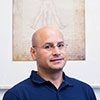
The National Institutes of Health’s National Institute of General Medical Sciences has awarded molecular cell biology Professor Nestor J. Oviedo and his lab $307,432 for one year to study the effects of direct-current stimulation in adult tissues.

The National Institute of Mental Health, part of the National Institutes of Health, has granted psychology Professor Sidra Goldman-Mellor $448,563 for three years to use California emergency department patient data to examine how suicidal behavior in adolescence affect teens' long-term risks for health problems and healthcare utilization.

UC Merced professor Ming-Hsuan Yang, in the School of Engineering’s Electrical Engineering and Computer Science program has received the AMiner Most Influential Scholar Annual Award in recognition of his “outstanding and vibrant contributions to the field of Computer Vision.” The award names the world's top-cited research scholars from the fields of Artificial Intelligence (AI), and recognizes outstanding technical achievements with lasting contribution and impact to the research community.

Electrical Engineering and Computer Science graduate student Thomas Thayer presented won the best paper award at the IEEE International Conference on Automation Science and Engineering (CASE) for his paper “Multi-Robot Routing Algorithms for Robots Operating in Vineyards,” that focuses on RAPID (Robot Assisted Precision Irrigation Delivery), a scalable irrigation management solution that aims to help vine growers with water conservation efforts while improving yield and quality.

Political science Professor Alexander Theodoridis has been awarded the Society for Political Methodology’s 2019 Miller Prize for the best paper in the influential journal Political Analysis with his paper "Worth Weighting? How to Think About and Use Weights in Survey Experiments."